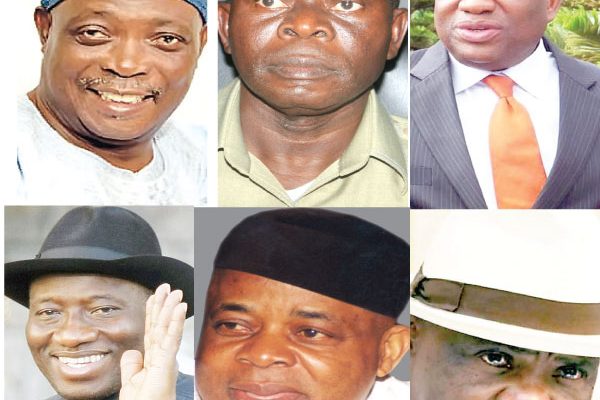

Controversy has always been inseparable from politics and politicking, but treachery and betrayals are proving to be alter egos in the politics of Nigeria’s Fourth Republic, writes General Editor, Taiwo Adisa.
ET tu Brute? (even you, Brutus) This is a famous line from The Tragedy of Julius Caesar, an eponymous play by English playwright, poet, and actor, Williams Shakespeare (1564-1616). It is a classical display of power play in the upper limits of political authority as dotted by treachery, deceit, and betrayals. It offers a quick reminder to wielders of power that as things were in the early centuries, so they remain, even now, as far as human characterisation in the social space is concerned.
Starting from May 1999, when Nigeria’s Fourth Republic was launched, politicians have never failed to live up to the archetypes of beings that are effortlessly treacherous, thus justifying the contention that treachery and betrayals are key foundation stones of the politics on display.

While the unfolding drama in Rivers State, South-South Nigeria, which has pitted former governor Nyesom Wike, now minister of the Federal Capital Territory (FCT) against his successor, Siminalayi Fubara is once again providing the key to unlocking the character analysis of the Nigerian politician, the circumstances for betrayals, treachery and controversy have remained constant in the polity.
Wike Versus Fubara

Even as the last has not been heard on the unfolding situation in the oil-rich Rivers State, the jury is already out there as to the possible causes of the tense moments being witnessed in the state in recent months. In October 2023, the Rivers State House of Assembly launched an impeachment drive against Governor Fubara, which shocked many Nigerians. The fact that the duo of Wike and Fubara enjoyed a chubby relationship hitherto provided the shock. Wike was all over the moon in his bid to install Fubara as governor in May 2023. He successfully hid his anointed successor, then gubernatorial candidate of the Peoples Democratic Party (PDP) away from the prowling sights of the Economic and Financial Crimes Commission (EFCC), which had placed him on its wanted list. Even though there was no hint of undercurrents, especially in the public glare when the state lawmakers flashed the yellow card on the governor, it is now apparent that the division that set into the midst of the governor and his predecessor was fundamental. A day before the assembly members launched the impeachment move, the House of Assembly building was gutted by mystery fire, an indication that the battle at hand promises to hit the heights of brutality.

Ever since, there has been an undulating back and forth in the affairs of the oil-rich state, with a sharp division creeping in. There have been claims by leaders of the Ijaw ethnic nationality that former governor Wike, was trying to deny the riverine areas the governorship slot, a position that has remained in the upland parts of the state since the restart of democratic rule in 1999. Some 27 members of the House of Assembly loyal to Wike had defected to the All Progressives Congress(APC), leaving only four in the governor’s camp. That looked like a sharp-edged arrow aimed at the forehead as the number already amounted to more than the two-thirds majority needed to impeach the governor.
The governor’s loyalists have also installed a Speaker for the assembly, who has declared the seats of the defectors vacant, while Governor Fubara had submitted the 2024 budget to the four-member assembly, which promptly ratified the bill. In the heat of the confusion over the impeachment plot, Fubara had publicly announced his readiness to soldier on, while asking his traducers to publicly announce his offence. The governor has since assented to the money bill, affirming the same as the State’s appropriation act for 2024, even though the Abuja accord asked him to represent the bill before the unified state assembly.
The Abuja accord was a product of the meeting called by President Bola Tinubu to find some quietness to the raging commotion. When it was made public, the accord asked both parties to withdraw cases from the court, while the loyalists of the former governor would also withdraw the impeachment notice. The governor was also asked to recall the commissioners who had resigned their appointments in solidarity with Wike, while the governor was mandated to allow the assembly a free run in the state. Elders, largely from the riverine section of the state and leaders of Ijaw ethnic nationality have, however, rejected the accord, calling it a death sentence for Fubara, who incidentally announced that the accord was not as bad as it seems.
Wike, in a major offensive against the elders who have criticised the Abuja accord, warned the people of the state not to get involved in political feud they know nothing about. He said: “Don’t get involved in any fight between two politicians without knowing the root cause. In any facet of life, there are rules and they must be obeyed. As a pastor, there are rules you must follow.
“So as politicians, we must follow rules. While I was governor I followed those rules, and that’s why I was able to succeed.”
While neither Wike nor Fubara has come out to state what the “rules” were, the contention out there is that the division that crept into their fold has much to do with the management of projects inherited by Fubara. There were claims that the incumbent governor was resisting the bid to comply with the payment terms for certain ongoing projects in the state. This development was said to have angered his predecessor, leading to the now-terminated impeachment move.
Even as the nation awaits the clock to run over the current Rivers State political drama, it is already clear, especially from Wike’s tone, that suspected treachery and betrayal remain at the root of the unfolding hoopla.
Adedibu versus Ladoja
On January 12, 2006, 18 of the 32 lawmakers of the Oyo State House of Assembly pronounced the impeachment of Governor Rashidi Ladoja, who had been helped to power by the then strongman of Ibadan politics, Alhaji Lamidi Adedibu. Adedibu’s grouse was that Ladoja as governor failed to carry him along in the running of the affairs of the state.
“Governor Ladoja has today been impeached, having been found guilty of allegations leveled against him,” said Honourable Olu Oyeleye, leader of a group of 18 lawmakers, who voted for the impeachment at the precincts of D’Rovas Hotel, Ring Road, Ibadan, the adopted chamber for the breakaway lawmakers, who had found the state assembly chambers impenetrable.
That crisis which saw Ladoja losing his seat for 11 months in 2006 was another classical case of godfatherism in Nigerian politics. The governor, though eventually reinstated by the Supreme Court was accused of betrayal by the godfather, who instigated the impeachment plot.
Even though Ladoja returned to his seat in November of that year, the scar of his impeachment left a permanent spot in his political career. By the time he returned, the primary process for the 2007 election had been done and dusted. His deputy, Adebayo Alao-Akala had taken the ticket of the PDP and was eventually elected in his stead. Ladoja’s subsequent attempts to return to Agodi Government House had failed to materialise.
Nnamani versus Nwobodo
Dr Chimaroke Nnamani was a medical practitioner in the United States of America, who returned home to contest the Enugu State governorship election in 1999. He won the election, riding on the back of Chief Jim Nwobodo, a former governor of old Anambra State and notable godfather in Enugu politics.
As it was difficult to discern the inner minds of a man from the conjecture on the face, so it was for Nwobodo to ascertain the true intentions of Nnamani, his political godson. As soon as Nnamani took over the reins in Enugu, he devised a means by which he would empower Young Turks whom he intended to use to displace the established political tradition in the state. He launched the Ebeano slogan to signpost his new leadership of the state and held a firm grip on affairs in the state. Nwobodo and other political heavyweights including the former National Secretary of the PDP, Chief Okwesilieze Nwodo became immediate victims as their tendencies were driven out of the state even before the reelection in 2003. Nwodo had to confirm in an interview that his hospital was shut down for fear of attacks by Ebeano loyalists The State House of Assembly got divided into two, while members loyal to Nwobodo and his Abuja politicians’ colleagues were largely banished to Abuja. There was no doubting the fact that Nnamani, one of the class of ‘99 governors regarded as Obasanjo boys had the backing of the then President Olusegun Obasanjo. He won the battle at that time, holding the reins of power firmly between 1999 and 2007.
Nnamani versus Sullivan Chime
Following the governorship election in 2007, Nnamani adopted Sullivan Chime as his successor and backed the same to victory. Chime was his Attorney General and Commissioner for Justice, both had attended the same secondary school. The Ebeano leader was said to have held the belief that he knew Chime well and that the gentle-looking lawyer would play the Ebeano card according to his (Nnamani’s) dictates.
The tide, however, changed immediately Chime took the reins of power. It was clear that Nnamani’s former schoolmate had other ideas that were only masked in the bid to take power. He practically banned the Ebeano slogan right from the inauguration podium and turned Nnamani and his core loyalists into sworn enemies. The former governor and his loyalists thereafter went through a torrid time in the hands of Chime, whom they had helped to power.
It was a case of Karma as Nnamani got the exact treatment he meted out to Nwobodo and other members of the old guard when he took power in 1999.
The former governor had lamented that Chime turned his policy of raising the children of nobodies into key positions in government upside down and that he was empowering the same established politicians he (Nnamani) fought against. Indeed, both politicians went separate ways during the 2011 polls, with Nnamani adopting People for Democratic Change (PDC) as his political platform, while Chime retained the PDP platform. Chime won his reelection and eventually succeeded in practically making Nnamani and his core loyalists persona non grata in Enugu State. The feud was only settled when Chime had left power.
Kalu versus Abaribe in Abia
One of the earliest political battles of the Fourth Republic was the feud between the then-governor of Abia State, Orji Kalu, and his deputy, Enyinnaya Abaribe. Less than six months into office, Kalu had flagged off an impeachment move against his deputy, alleging “gross misconduct.” Abaribe was accused of colluding with some transport sector operators to print tickets, an allegation he vehemently described as frivolous and a setup. The matter ended up dividing the PDP in the state along the Ukwa/Ngwa and Old Bende lines. Though the first impeachment move against Abaribe failed, that did not stop Kalu’s camp from launching two other bids between 2000 and 2003. The development, according to sources was hinged on allegations of disloyalty against the deputy governor, even though the articles of the alleged disloyalty were not made public. There was also the growing power tussle between Abuja politicians and the home-based team led by the governor at the time. The Abuja group largely supported Abaribe, who eventually defected to the All Nigeria Peoples Party (ANPP) after the failure of the third impeachment bid against him early in 2003.
Kalu versus Theodore Orji
In line with the wishes of Governor Orji Kalu, his Chief of Staff, Theodore Orji was sworn in as his successor in 2007. But it wasn’t long before a battle of wits took over the scene of Abia politics again. Kalu had in 2007 floated the Peoples Progressive Alliance (PPA) and won the governorship seat of Abia and Imo States. It was understood that Theodore Orji got wind of Kalu’s plans to merge with the PDP and had gone ahead of him to personally align with the PDP and secure the party’s ticket for the 2011 election. That and some other undercurrents were said to have angered Kalu who moved massively against his successor. The battle lasted through the years of Orji as governor.
Mbadinuju versus Uba
The battle for the control of Anambra politics was also intense between 1999 and 2003. Governor Chinwoke Mbadinuju was elected under the platform of the PDP in 1999 but he had to contend with power brokers who had the backing of President Obasanjo in Abuja. One of the most influential presidential aides of the era, Dr Andy Uba is an indigene of the state, while his brother, Chief Chris Uba was pulling strings around the states of the South-East, not just as the political godfather but as an enforcer. Controversy, violence, and instability were the lots of Anambra as the power brokers aimed to seize the control off Mbadinuju, who was also having it rough with the civil servants and civil society. Little wonder he was denied the PDP ticket in 2003 and when he sought reelection on the platform of the Alliance for Democracy (AD), he lost to PDP’s candidate, Dr Chris Ngige, who eventually was removed via a court order and replaced with Mr Peter Obi of the All Progressives Grand Alliance (APGA).
Amaechi versus President Jonathan
Not many were aware that President Goodluck Jonathan was a good friend of the former governor of Rivers State, who later served as Minister of Transportation in the administration of President Muhammadu Buhari, Mr Rotimi Amaechi. Amaechi and Dr Jonathan’s paths had crossed in Port Harcourt and sources said that they developed a good relationship. It was said that when Amaechi was to constitute his cabinet as governor, he asked President Jonathan to nominate two commissioners and that when one of the commissioners died, he still got back to Jonathan to fill the slot. To reciprocate, Jonathan was said to have nominated Amaechi’s Chief of Staff, Nyesom Wike as minister. But things were said to have snapped when Amaechi was said to have started cultivating friendship across the Niger in readiness for a shot at the nation’s presidency in 2015. It was said that Amaechi had linked up with the former Speaker of the House of Representatives who later served as governor of Sokoto State, Aminu Waziri Tambuwal for a possible pair-up in a presidential race. Before then sources had said that Jonathan had alerted Amaechi to a flag on the accounts of his state by the financial intelligence arm of the government and asked him for restitution.
As the politics of 2015 intensified, both parties went separate ways with Amaechi joining the PDP crew which eventually defected to the All Progressives Congress (APC) to ruin Jonathan’s second-term bid.
Amaechi versus Wike
The cracks that crept into the Jonathan/Amaechi relationship automatically affected the relationship between Wike and the then-governor of Rivers State, Amaechi. With Amaechi finding himself aligned with the opposition forces, Wike became a close ally of President Jonathan and was eventually adopted as the governorship candidate of the PDP for the 2015 election. The enmity that engulfed the midst of the trio of President Jonathan, Amaechi, and Wike continued to fuel disagreements, anger, and bad blood between Wike and Amaechi as the former took office as governor. That enmity continued as the duo became pillars of opposing forces. Wike was leading the PDP front, while Amaechi led the APC battle. Wike, however, succeeded in running Amaechi and his loyalists largely out of town, while he vowed not to touch a stand-out project of the Amaechi administration-Port Harcourt Metroline, which has remained abandoned to date.
Akpabio versus Udom Emmanuel
In the twilight of his administration as governor of Akwa-Ibom State, Senator Godswill Akpabio, now president of the Senate of the 1oth National Assembly practically plucked Udom Emmanuel from the banking sector.
That was because of the rift between him and the then Secretary to the State Government, (SSG) Obong Umana Okon Umana. Before that rift, many in Akpabio’s cabinet were said to have concluded that Umana would take over the reins in 2015. But it was said that Akpabio’s bid to have Umana nominated as the Managing Director of the Niger Delta Development Commission (NDDC) by President Jonathan sparked a row between him and Umana. It was said that Umana saw the move as a way of removing him from the centre of power in Uyo, a development that angered Akpabio, who immediately searched out Udom Emmanuel, and made him SSG and later governorship candidate.
As the Udom’s political godfather, Akpabio expected his protégé would keep learning at his feet for long. But within a short time, Udom chose to become his own man, sacked the cabinet Akpabio had set up for him, and faced his lane. The battle became so intense that Akpabio was unable to win his return bid to the Senate in 2019 due to what sources called the machinations of Udom’s political structure. The tense moments between the two camps did not start loosening up until midway into Udom’s second term.
Kwakwanso versus Ganduje
The story of the former governor of Kano State and presidential candidate of the New Nigeria Peoples Party (NNPP) in the 2023 election, Dr. Rabiu Musa Kwakwanso, and his successor Dr. Abdullahi Ganduje is also replete with betrayals and controversies. Kwakwanso would spare no word to state that Ganduje owes his political ascendancy to him, having allowed the latter to serve as his deputy for two terms and also supported him to become governor of Kano State.
Having been Ganduje’s benefactor on different occasions, Kwakwanso expected the incumbent National Chairman of APC to reciprocate such gestures and remain his political ally for life. That was not to be, however, as Ganduje charted his course immediately after becoming governor. Things went bad to the extent the duo practically became sworn enemies. Indeed, Kwakwanso had to leave the APC and form the NNPP when the environment became unconducive. The duo of Kwakwanso and Ganduje anointed different gubernatorial candidates in the build-up to the governorship election in Kano in 2023, their camps squaring up in a titanic battle. Though Kwakwanso’s NNPP was declared a winner at the first instance by the Independent National Electoral Commission (INEC), the matter is awaiting a final seal by Nigeria’s apex court at the time of this report.
Oshiomhole versus Obaseki
The situation in Edo State is another affirmation that betrayal, treachery, and confusion rule the world of politics. At the end of his second term in office, former governor of the Edo State, Adams Oshiomhole endorsed his ally and member of his cabinet, Godwin Obaseki as his successor. The PDP fought tooth and nail to win the election with Pastor Osagie Eze-Iyamu as candidate. Not long after he assumed office, however, Obaseki bared his fangs and decided to be his own man.
The bad blood and hot exchanges made Oshiomhole swear to unseat his former ally, who was eventually denied the governorship ticket for a second term in office. However, Obaseki succeeded in playing the cat with nine lives as he switched over to the PDP and won the election on that platform. Right now, Obaseki is rounding off his tenure and he is said to be toeing the same Oshimohole path, by seeking out an associate as his preferred governorship candidate. Whether it would work for him remains to be seen.
Though it cannot be said that relationships between and among politicians have been all doom since the restart of democracy in 1999, a good number of bonds suspected to have firm roots have broken up like egg shells. It’s all about the human character in clear agreement with Shakespeare: “There is no art to find the mind’s construction in the face.”
READ ALSO FROM NIGERIAN TRIBUNE








